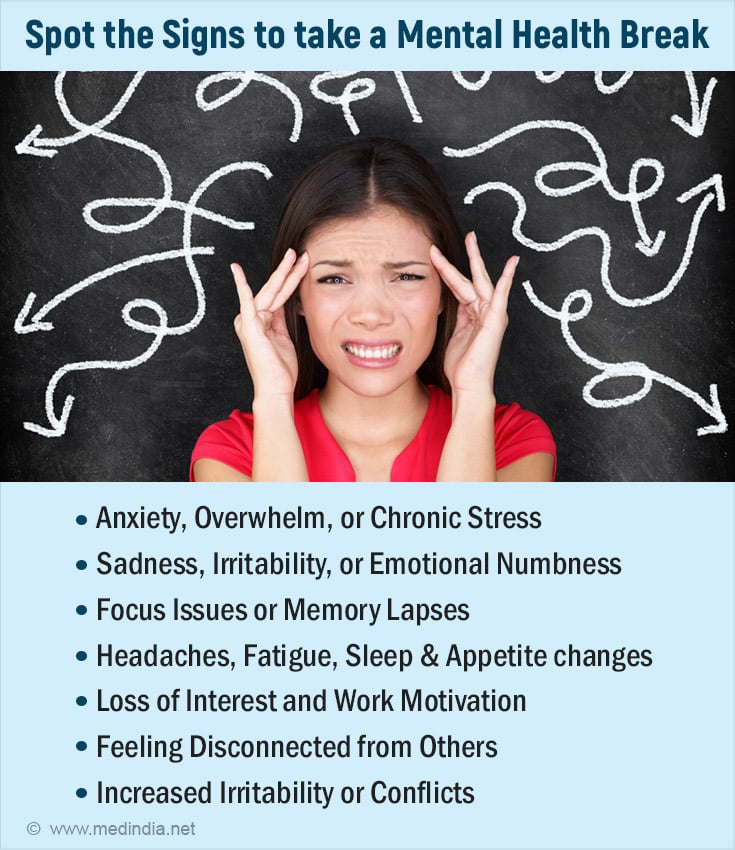- Signs you need a mental health break and how to take one - (https://wellin5.ca/signs-you-need-a-mental-health-break-and-how-to-take-one)
- Signs it's time for a mental health break - (https://www.mhrbwcc.org/blog/signs-its-time-for-a-mental-health-break/)
About
In our fast-paced world, it’s easy to overlook the signs that your mental health needs attention. Whether it’s due to work, personal life, or just the general demands of daily living, our minds can become overwhelmed, leading to a range of symptoms that signal the need for a mental health break. Recognizing these signs early can help you take the necessary steps to recharge and protect your well-being.
Did You Know?
Taking a mental health break can boost productivity and well-being. #mentalhealth #medindia #break
Seven Signs It's Time to Take a Mental Health Break
1. Experiencing Anxiety, Overwhelm, or Chronic Stress
One of the most common signs that you need a mental health break is a persistent feeling of anxiety, being overwhelmed, or constantly stressed(1✔ ✔Trusted Source
Signs you need a mental health break and how to take one
Go to source). These feelings may manifest as racing thoughts, restlessness, or an inability to relax. If you find that you’re struggling to manage your daily tasks or responsibilities and everything feels like too much, it’s a clear sign that your mind and body are in need of rest.
What to Do: Take a step back from your current responsibilities. Engage in mindfulness practices such as meditation or deep breathing exercises to calm your mind. Consider taking a day or two off from work to recharge.
2. Persistent Feelings of Sadness, Irritability, or Emotional Detachment
Persistent sadness, irritability, or a sense of emotional numbness are strong indicators that your mental health is suffering. These feelings can be linked to depression or burnout and can significantly impact your quality of life. You may find yourself snapping at others more frequently, feeling tearful without any apparent reason, or experiencing a lack of interest in activities that used to bring you joy.
What to Do: Recognize these emotions and allow yourself to feel them without judgment. It may help to talk to a trusted friend, family member, or mental health professional. Taking time off to engage in activities that you enjoy or that make you feel more connected to yourself can be beneficial.
3. Struggling with Focus or Memory Lapses
When your mind is overloaded, it becomes harder to focus, and you might notice that you’re having difficulty concentrating or experiencing memory lapses. This cognitive fog is often a result of stress or mental exhaustion. Tasks that you used to complete with ease might now take twice as long, or you may forget important details more frequently.
What to Do: Take regular breaks throughout your day to give your brain a rest. Consider activities that stimulate your brain in different ways, such as puzzles or reading for pleasure. A mental health break that includes restful sleep and minimal screen time can also help improve cognitive function.

4. Headaches, Fatigue, Sleep Disruptions, or Appetite Changes
Your body often gives you clues about your mental health. Physical symptoms like headaches, persistent fatigue, sleep disturbances, and changes in appetite can all be linked to mental stress. These symptoms occur because your body is responding to prolonged mental strain, which can lead to a breakdown in your physical health.
What to Do: Pay attention to these physical symptoms and address them promptly. Ensure you’re getting enough sleep, eating a balanced diet, and staying hydrated. If these symptoms persist, consider seeking medical advice. Taking time off to rest your body and mind can be a crucial step in recovery(2✔ ✔Trusted Source
Signs it's time for a mental health break
Go to source).
5. Declining Interest and Motivation in Work
A significant decrease in enthusiasm for your job or daily tasks can indicate that you’re mentally and emotionally drained. You might find yourself dreading going to work, feeling uninspired, or lacking motivation to complete your tasks. This can be a sign of burnout, which requires immediate attention to prevent further decline in mental health.
What to Do: Reflect on what aspects of your work or routine are causing the most stress. It might be helpful to delegate tasks or prioritize what’s truly important. Taking time off to pursue a hobby or engage in creative activities can reignite your passion and motivation.
6. Feeling Disconnected or Having Difficulty Relating to Others
Feeling disconnected from others or finding it difficult to relate to people around you is another red flag. This sense of isolation can make you feel like you’re going through life alone, even when surrounded by others. You may struggle to communicate your feelings or find it hard to connect with loved ones.
What to Do: Reach out to someone you trust and talk about what you’re experiencing. Social support is crucial during times of mental strain. If you’re feeling particularly isolated, consider joining a support group or engaging in activities that involve social interaction. A mental health break can also help you reconnect with yourself, making it easier to reconnect with others.
7. Heightened Irritability or Increased Conflicts with Others
When you’re mentally exhausted, you may find that your patience wears thin more quickly, leading to increased irritability or conflict with others. You might notice that you’re more easily frustrated or that small things set you off more than usual. This can strain your relationships and further contribute to your stress levels.
What to Do: Acknowledge these feelings of irritability and take a step back before reacting. Practice self-compassion and understand that these feelings are a sign that you need a break. Removing yourself from stressful situations, even temporarily, can help you regain perspective and approach conflicts more calmly.
Recognizing the signs that you need a mental health break is the first step in taking care of yourself. Mental health is just as important as physical health, and taking the time to rest and recharge can make a significant difference in your overall well-being. Whether it’s through a short break from work, engaging in activities that bring you joy, or seeking support from loved ones or professionals, prioritizing your mental health is essential for leading a balanced and fulfilling life.









